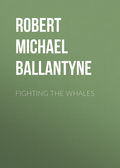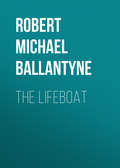
Robert Michael Ballantyne
The Life of a Ship
The day of the launch was a great day at the seaport where Davy lived. The launch of a large ship is always a very interesting and wonderful sight indeed; so that thousands and thousands of people flock from all directions to see it. Whichever way Davy looked he saw crowds of people, some on foot, some on horses, some on donkeys, and some in carriages, all streaming towards the one great point—the ship-builder’s yard. It seemed quite like a holiday or a fair, and was such a bright, warm, sunny day that people’s hearts felt far lighter than usual. Davy saw all this at a glance the moment he left home; and, throwing his red nightcap into the air, he gave one long loud hurrah! and ran away as fast as his heavy fishing-boots would let him.
The ship was very different now from what it had been when he first saw it. There were four little masts put up in it, on which were hoisted gay and gaudy flags. Her “hull,” or body, was now coppered and neatly painted, while all the rubbish of the building-yard was cleared away, so that everything looked neat and clean. The stocks, or framework on which she had been built, sloped towards the water, so that when the props were knocked away from the ship, she would slide by her own weight into the sea. Ships are always built on sloping stocks near to the water’s edge; for you can fancy how difficult it would be to drag such a great thing into the water by main force. In order to make her slip more easily, the “ways,” down which she slides, are covered with grease.
Very soon the crowds of people stood in silence, expecting the great event of the day; and, as the moment drew nigh, the band, which had been playing all morning, suddenly stopped. Davy became very anxious, because he was so little that he could not see in the crowd; but, observing a post near at hand, he struggled towards it and climbed to the top of it. Here he saw famously. The workmen had begun to knock away the props; there was just one remaining. At this moment a lady stepped forward with a bottle of wine in her hand to christen the ship. This she did by breaking the bottle against the cutwater; just at that instant she began to move. Another second and the Fair Nancy rushed down the incline, plunged heavily into the water like some awful sea-monster, and floated out upon her ocean home amid the deafening cheers of the people, especially of little Davy, who sat on the top of the post waving his red cap and shouting with delight.
After the launch Davy and all the people returned home, and the Fair Nancy was towed to the “shear-hulk” to have her masts put in. The shear-hulk is a large ship in which is placed machinery for lifting masts into other ships. Every one who has looked at the thick masts of a large vessel, must see at a glance that they could never be put there by any number of men. Machinery is used to do it, and the shear-hulk contains that machinery; so that when a ship has to get her masts put up she is dragged alongside of this vessel. In the meantime Davy renewed his prayer to his father to let him go to sea, and at last the old man consented. His mother cried a good deal at first, and hoped that Davy would not think of it; but his father said that it would do him good, and if he became tired of it after the first voyage he could give it up. Davy was overjoyed at this, and went immediately to his friend the fisherman, Ben Block, who was very much delighted too, and took him to a shop to buy clothes and a sea-chest for the voyage.
“You see, lad,” said Ben, “the ship is bound for Quebec with a mixed cargo, and is to come back loaded with timber; and as the season is coming on, you’ll need to get ready quick.”
“That I shall,” replied Davy, as they entered a shop. “Ho! shopman, give me a straw hat, and a blue jacket, and a pair o’ duck trousers, and—”
“Stop! stop!” cried Ben, “you’re sailing too fast. Take in a reef, my lad.” Ben meant by this that he was to proceed a little slower. “You’ll want a ‘sou’-wester,’” (an oilskin hat), “and a ‘dread-nought,’” (a thick, heavy coat), “and things o’ that sort.”
After Davy had bought all he wanted, and ordered a sea-chest, he went home to his mother, who was very sad at the thought of parting with him. When the day of departure came she gave him a great deal of good advice, which Davy promised, with tears in his eyes, to remember. Then she gave him a little Bible and a kiss, and sent him away. His father took him to the beach, where the ship’s boat was waiting for him; and, as the old man took off his cap, and raising his eyes to heaven, prayed for a blessing on his little son, Davy, with watery eyes, looked around at the big ships floating on the water, and, for the first time, wished that he was not going to sea.
In a few minutes he was on board the “outward-bound” ship. This is what we say of ships when they are going out to sea; when they return from a voyage we say that they are “homeward-bound.” The Fair Nancy was a noble ship, and as she hoisted her snow-white sails to a strong wind, (a stiff breeze, as Ben Block called it), she looked like a white cloud. The cloud seemed to grow smaller and smaller as Davy’s father and mother watched it from the shore; then it became like a little white spot on the faraway sea; then it passed over the line where the water meets the sky, and they saw it no more!
After Davy had cried a great deal, and wished very often that he had not been so determined to leave home, he dried his eyes and began to take great interest in the curious things he saw around him. What surprised him most of all was, that although he actually was at sea, he could not see the sea at all! This was because the sides of the ship, which are called “bulwarks,” were so high that they quite prevented the little boy from seeing overboard. Davy soon found an opening in the bulwarks, however, which his friend Ben called the “gang-way,” through which he could see the water and the ships and boats that were sailing there. And when he mounted the high part of the deck in front of the ship, which is called the “forecastle,” or when he went upon the high deck at the stern of the ship, which is called the “poop,” then he could see all round. And what a wonderful and new sight it was to Davy! His cottage was gone! The beach, and the pier where the nets used to hang, were gone. The trees and fields were all gone, and there was nothing but sea, sea, sea, all round, so that the Fair Nancy seemed the only solid thing in the whole wide world! But poor Davy did not look or wonder long at this, for the breeze freshened, and the waves rose, and the ship plunged, and Davy felt very queer about the stomach! There is a man in every ship called the “steward,” and everybody loves that man, because he goes about from morning till night trying to do people good and to make them happy. He looks after breakfasts, dinners, teas, and suppers. He answers every one who calls, and gets for everybody anything that they want. He is never ill, never in a hurry, never in a bad temper; in fact, he is a very charming man.







